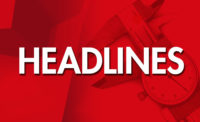"This is an important extension of our calibration capabilities," says Pat Nugent, vice president, metrology systems, Mahr Federal Inc. "Now customers can have large measurement systems-such as form and geometry systems, surface finish systems and length measurement systems-calibrated onsite with the added benefit of accreditation. Accreditation to do this work in their facilities enables our technicians to better evaluate the effects of environment and other conditions on the quality of their measurement processes."
Mahr Federal offers an inspection and recalibration program for dimensional standards, and calibration and certification services for a wide range of gages. ISO/IEC 17025 Accreditation defines general requirements for the competence of testing and calibration laboratories. According to Nugent, "17025 assures that labs operate in accordance with ISO 9001, but ISO 9001 alone does not demonstrate the competence of a lab to produce technically valid results. Certification to ISO 17025 provides that evidence."
"Key to the quality of any measurement is its uncertainty," says Nugent. "We have been able to develop mathematical models of how ambient conditions may affect the uncertainty of various measurements compared to those same measurements made in the ideal conditions of our metrology lab. By accounting for variation in conditions such as temperature and vibration at a customer's facility, we can show them empirically how improving control over those conditions can improve their quality process."
Another benefit of uncertainty values is that they can help manufacturers select the best qualified calibration service provider. "The uncertainty values in a Scope of Accreditation are a measure of the quality of that service," Nugent says. "The educated customer will compare his calibration requirements with the uncertainty rankings for those things among competing service providers and make his selection not just on price, but on quality of service."





